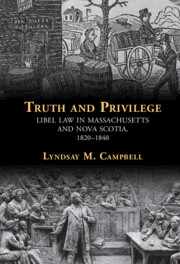Book contents
- Truth and Privilege
- Studies in Legal History
- Truth and Privilege
- Copyright page
- Contents
- Tables
- Foreword – The Osgoode Society for Canadian Legal History
- Acknowledgments
- 1 Introduction
- 2 The Common Law’s Diverging Paths
- 3 The Transformation of Privilege
- 4 Truth, Privacy and Authority
- 5 The Individual Conscience and Blasphemous and Obscene Expression
- 6 Private Defamation Suits
- 7 Conclusion
- Book part
- Bibliography
- Index
- Publications of the Osgoode Society for Canadian Legal History
3 - The Transformation of Privilege
Published online by Cambridge University Press: 16 December 2021
- Truth and Privilege
- Studies in Legal History
- Truth and Privilege
- Copyright page
- Contents
- Tables
- Foreword – The Osgoode Society for Canadian Legal History
- Acknowledgments
- 1 Introduction
- 2 The Common Law’s Diverging Paths
- 3 The Transformation of Privilege
- 4 Truth, Privacy and Authority
- 5 The Individual Conscience and Blasphemous and Obscene Expression
- 6 Private Defamation Suits
- 7 Conclusion
- Book part
- Bibliography
- Index
- Publications of the Osgoode Society for Canadian Legal History
Summary
Chapter 3 describes the evolution of privilege, as used by legislatures – especially in Nova Scotia – to discipline and punish both members and nonmembers for criticisms that impugned the dignity of the legislature or its members. As the reformist Nova Scotian assembly was, by the late 1820s, embroiled in budgetary disputes with the council, the stage was set for jurisdictional arguments. In his 1830 libel treatise the English writer Thomas Starkie advanced a framework to protect freedom of expression through expanding the reach of “qualified” privilege. Massachusetts courts were chiefly concerned with truth and bore a certain republican suspicion of privilege, so although the defense of privileged communication did arrive in Massachusetts, it did not attract much interest. In Nova Scotia, however, given the common law’s rejection of a truth defense to criminal libel and the prevalent concern with the jurisdiction of institutions, qualified privilege did take root, with journalist Joseph Howe relying heavily on Starkie in a famous trial in 1835.
Keywords
- Type
- Chapter
- Information
- Truth and PrivilegeLibel Law in Massachusetts and Nova Scotia, 1820-1840, pp. 82 - 161Publisher: Cambridge University PressPrint publication year: 2021

